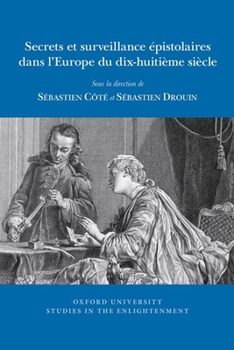Secrets Et Surveillance Ã(c)Pistolaires Dans l'Europe Du Dix-Huitième Siècle
In a century marked by innumerable armed conflicts and incessant theological quarrels, including tensions between the Church, the State and the Philosophes, literary correspondence provides a privileged site via which to examine the mechanisms of surveillance. Epistolary communication was at the heart of daily life among the eighteenth-century literati. Familiar with methods of surveillance, the Enlightenment elite often amused themselves by sending...
Format:Paperback
Language:English
ISBN:1802078770
ISBN13:9781802078770
Release Date:December 2023
Publisher:Voltaire Foundation in Association with Liver
Length:208 Pages
Customer Reviews
0 rating





